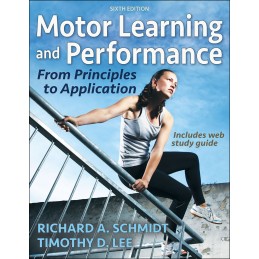Motor Learning and Performance:: From Principles to Application, Sixth Edition With Web Study Guide, enables students to appreciate high-level skilled activity and understand how such incredible performances occur. Written in a style that is accessible even to students with little or no knowledge of physiology, psychology, statistical methods, or other basic sciences, this text constructs a conceptual model of factors that influence motor performance, outlines how motor skills are acquired and retained with practice, and shows students how to apply the concepts to a variety of real-world settings.
The sixth edition of
Motor Learning and Performance has been carefully revised to incorporate the most important research findings in the field, and it is supplemented with practice situations to facilitate a stronger link between research-based principles and practical applications. Other highlights include the following::
- A web study guide offers updated principles-to-application exercises and additional interactive activities for each chapter, ensuring that students will be able to transfer core content from the book to various applied settings.
- Extensive updates and new material related to the performance of complex movements expand the theoretical focus to a more in-depth analysis of dynamical systems and the constraints-led approach to learning.
- Narratives from Motor Control in Everyday Actions that appear in the web study guide tie each book chapter to concrete examples of how motor behavior is applicable to real life.
- Photo caption activities pose questions to students to encourage critical thinking, and answers to those questions are provided to instructors in the instructor guide.
As the text investigates the principles of human performance, pedagogical aids such as learning objectives, key terms, and Check Your Understanding questions help students stay on track with learning in each chapter. Focus on Research and Focus on Application sidebars deliver more detailed research information and make connections to real-world applications in areas such as teaching, coaching, and therapy.
The sixth edition of
Motor Learning and Performance:: From Principles to Application goes beyond simply presenting research—it challenges students to grasp the fundamental concepts of motor performance and learning and then go a step further by applying the concepts. Incorporating familiar scenarios brings the material to life for students, leading to better retention and greater interest in practical application of motor performance and learning in their everyday lives and future careers.


 Dostawa
Dostawa
 Płatność
Płatność
 Zwroty
Zwroty
